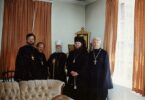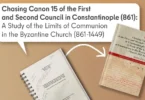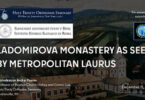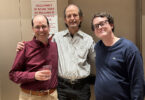This interview was conducted for this website Historical Studies of the Russian Church Abroad in 2021 by Fr. Daniel Franzen in fulfilment of the requirements for the graduate class The Russian Church Abroad Its History and Identity 723 offered at Holy Trinity Orthodox Theological Seminary.
Your Eminence, good afternoon and thank you for agreeing to this interview. The first question I have for Your Eminence is: As the ruling Bishop of the Chicago and Mid-America Diocese of the Russian Church Abroad, what is your perception of the health of the diocese and the Russian Church abroad in general?
Our diocese was founded 65 years ago as the Diocese of Chicago and Cleveland. It has grown. And since it grew and outlived the territory of Chicago and Cleveland, and then the territory of Chicago and Detroit, it is now called the Diocese of Chicago and Mid-America, and 16 states compromise [sic] our diocese. There are two main areas where the network is most intricate. This is the Great Lakes area and Texas. We have churches also in Arkansas, in Oklahoma, what have you, but probably the main centers are the Great Lakes area and Texas. Most important of course is not the material health of the church, though that is also important, but hopefully the spiritual health, as you put it in the question. We strive to… as any church, our goal is the salvation, but of course, to beautify our churches we have to expand them. That also helps because, for instance, in Saint Louis when we were in a very small, almost barrack-type church, it had a cupola and everything, but it didn’t have the outward appearance of a regular Russian church. We only had so many parishioners when we built a church in the true Russian style. All of a sudden, we got people appearing from nowhere and I thought there were recent Russian arrivals. And I said, “When did you come to the Saint Louis area?” “Oh, 20 years ago.” So where were they all that time. Well, maybe it’s because people… in Russia, Ukraine, there’s churches at every intersection. They’re used to that, and they’re used to having a church that appears as a church, and they’re not used to attending services in storefronts or converted barracks. So, I don’t know but I think that the outward appearance of churches does have missionary importance.
As for the Russian Church Abroad in general, it’s hard to say what our future holds. I don’t know but I’m afraid that maybe with Americanization of our youth – and that will happen inevitably – we might have to reevaluate how we approach things. And I’m not saying the Irish here are necessarily a good example of how things must be done, but for instance, in America, the descendants of the original Irish immigrants, they’ve lost the language. But they recall that they’re Irish. They’re proud of it. They’re Catholic. At least they were until recently. And on Saint Patrick’s Day every American is an Irishman. What I want to say is that they were able to keep their identity even though they lost their language.
And do you think that’s possible?
Well, we would have to learn. I was for two years in Jerusalem as the Chief of the ROCOR Mission. They brought in the Russian Jews. There are such strict rabbinical laws and there’s a rabbinical college that (although not officially) regulates life in Israel, and this is why I say, “Be careful how you use this,” because I’m not sure exactly how it works politically, but there’s a rabbinical college, and the Jewish immigrants from the former Soviet Union, they let them do anything they want. They trim [sic] ham, they drive on Saturdays. They let the grandparents do that and the parents. But the children, that is their focal point. So, I don’t know. But the Jews do their homework, but then that’s in the state of Israel. So, maybe it’s possible. The Jews here in America, I’m told, are also assimilating. And so, I don’t know. But it’s just interesting that… the Italians. Italians are so proud of their heritage. Though not all of them speak Italian. I don’t know. But I’m just saying that maybe it’s something we should look into. How did they keep their identity? Because these are people, “Oh yes, I’m Russian, my mother made pierogies. My grandmother wore a babushka.” But that’s it. That’s not remembering your heritage.
On that note, I’m going to skip to another question that I had later, but I’ll ask it now if you don’t mind. What would you say to American converts about the Church Slavonic language and its importance as a liturgical language and its continued usage in propagation? How could this best be done?
This is very difficult to answer categorically. There has to be a balance. If it’s a large Russian parish, like our cathedral parish here that is Russian-speaking, anyone that comes in cannot demand that we use so much English. There are English-speaking ROCOR parishes. But I guess it all depends on the congregation. The Slavonic language is beautiful, and if we were to lose it, it would be our loss. But at the same time, it’s not the language. It’s the faith. And if you remember 1,000 years ago, 1,200 years ago, when Kirill and Mefodii were trying to [be] the missionaries among the Slavs, Rome protested that they could only, you know, in Hebrew, Greek, or Latin, and that was proven wrong. At the same time, knowledge of Hebrew and Greek and Latin is important to study scriptures, what have you, to do translations. So, the balance, I guess it all depends on the congregation, the ethnic background of the congregation. Sometimes people come in and they protest, a few old ladies are against use of English. And what the old ladies should understand – and I’m just saying that theoretically – that if they want someone to take over, they have to let them get involved. But on the other hand, the newcomers understand that this older generation; they gave everything they had to build the church so in their olden days they can have something. So where is the balance? How do you find that? How do you regulate that? I guess every individual case is…
Situationally dependent?
Yes.
I see. Following the ROCOR reunification with the Moscow Patriarchate, what mutual benefits have been received by ROCOR and the Russian Orthodox Church, respectively, if any? And have there been any challenges?
Well, ROCOR lived independently before unification, and we were self-sufficient. Of course, this division was regrettable, and we were very happy: we lived for the time when unification would occur, and to God be the glory, it did occur. Now, what benefits? Well, now we’re able to travel to Russia. And our people, even though they’ve always communed, and they participate in church services, it was the clergy that could not participate. So now that problem has been solved. What the Russian church got from us, that might be difficult for me to answer living abroad, but I think… when I taught in Jordanville, I always said to the students – and this was years before reconciliation – I told our students that even if the Russian church abroad eventually completely disintegrates, but everything we did, everything we testify to, everything we witness, everything remains for the future generations, we’ve reached our goal. You know, the witnesses of the new martyrs. And it’s not that the people in the Soviet Union were purposely lying, they lived under a… I mean, many of them I’m sure and I know were happy that we witnessed what was going on, but they couldn’t officially support what we were saying. Now, even the Patriarch and all of their sermons, when they talk about that era, they talk it in the language that we use. You know, “The godless regime.” So, something that we’ve kept got through.
Very good. Thank you. Could you please explain how the diocesan pastoral school came to be and how it has developed since its inception?
I will say what I know. Father Gregory [Joyce] could add maybe. The idea of distance learning was started by the late Bishop Alexander (Mileant) of South America. The South American Diocese was and is poor, but they were in need of clergy and Vladyka decided to see what he can do to establish, maybe not distance learning yet, but somehow a program that would be accessible through the Internet. And Vladyka was working on that, but he became ill and eventually died of cancer. We were schoolmates, Vladyka Alexander, and I. And I asked him because we were thinking about doing something for our diocese. The thing is, at that time, Jordanville taught exclusively in Russian, and the program was five years. A single seminarian could go to Jordanville. A married seminarian either had to somehow provide for his family that stayed behind, or if he took the family to Jordanville, find lodging and work. And that was very difficult. So, I spoke with Vladyka and I asked him about his program and he literally signed it all over to us. I taught in Jordanville for 29 years, but I am not that familiar with the administrative workings. Father Martin Swanson, who is the director of Saint Basil Church in Saint Louis, was the provost for many, many years of Saint Louis University [Fr. Martin passed away in 2022 –editor]. And he also taught there. He has a Ph.D. And I asked him to help, and he developed this distance learning program, and I am told it’s one of the better ones. Even Saint Vladimir’s Seminary attested to that. So, this is how the pastoral school came to be, to help potential students from our diocese who couldn’t go to Jordanville, couldn’t leave their families, and be able to do distance learning. It wasn’t in competition with anyone or anything, but since the school was established, we have had seminarians or students from all jurisdictions, from all continents. Father Gregory, would you like to add anything? Maybe how many graduated from us.
So, the number that graduated I have here. It’s 30-something but I can’t remember exactly. But I’ll pull it out and get it.
We’ve been in existence for 12 years.
[Archbishop Peter turns to Fr. Gregory Joyce, Dean of the Pastoral School, who was also present at the conversation.]
[Fr. Gregory:] No, it’s 15 now, 15 years. I’ll find it and get that exact number. I think probably the most important thing that our school has been able to do is to provide that in-place education for those who want to serve the church but just can’t go to a residential seminary. I mean, I went to residential seminary; the best years of my life, but I understand that not everybody can do that. And so that’s essentially what we’re able to do. And it’s also allowed us to have good relations with the rest of the Russian Orthodox Church.
We talked first in this interview about reconciliation. And I think this is one of those things that can become just something that you hang on the wall and has no impact whatsoever on your life, but through the education of the next generation of clergy and the future generations of clergy, we can have this reconciliation.
So, the school provides a great opportunity for the reconciliation in that if we want it to be a living, breathing thing, the interaction of students and the next generation of clergy and leaders of the church is a great way to see to it that that happens. So, we’ve tried to leverage the school to make that reconciliation an ongoing thing. And that’s been really exciting for us and really, it’s been a great opportunity. And thank God we’ve had a chance for that.
[Archbishop Peter continuing]
But also, maybe we should say that our school received… if not official recognition, at least they took notice of us, the Russian academies and the Academy in Kiev and the Academy in Saint Petersburg, established a working relationship with us.
[Fr. Daniel Franzen] Yes. Absolutely. And as a graduate myself of the program, I can attest to its rigor and seriousness which I always appreciated.
[Father Gregory]
And thank God. And just for the record, one of our graduates, Alexander Andreev, was accepted into the academy in Saint Petersburg. He finished his doctorate there and he received the first doctorate issued to anyone in any church topic since before the revolution in Saint Petersburg. So, it’s really quite something significant and thank God he was from our school.
The last question I want to ask is the last one because it pertains to another role that you have Your Eminence. As the Russian Church Abroad’s endorser for clergymen who desire to be military, prison, or hospital chaplains, what is your understanding of the importance of chaplaincy in general, and why is or isn’t it important for ROCOR clergy to have a presence in this line of work in this country?
Well, chaplaincy, like any priest’s vocation, is for the salvation of people’s lives. And we have people in prisons, hospitals, and the military that need spiritual supervision or nourishment. And with everything going on, even in the Orthodox world, some of these really liberal tendencies are seeping through. People are actually looking for ROCOR’s involvement, so that is it. That is it. In the military, if one of our Orthodox service persons are somewhere where there’s only OCA priests or Greek priests… no problems attending, but we have – especially with the Americans now growing up in the Church Abroad – interest for ROCOR to be somehow represented and present. And this is where I come in, I’m the endorser.
Okay. Well, thank you very much for your time, Your Eminence. And it was a pleasure for me to speak with you.
The pleasure is all mine.
Conducted by Priest Daneil Franzen









